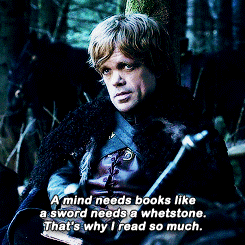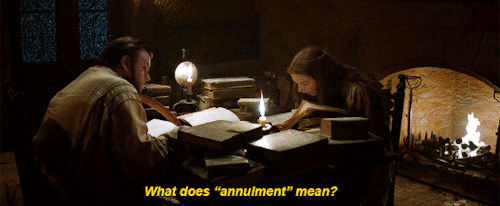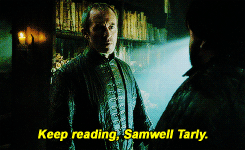Reading in “Harry Potter” and “Game of Thrones”
Like winter, the final season of Game of Thrones is coming. As tempting as it is to use Harry Potter as a model to try to predict the ending of another fantasy series, it seems safe to say that if things carry on as they have for the last seven seasons, Westeros will see a lot more violence, gore, death, and tragedy than the wizarding world did. Maybe, if we’re very lucky, there will be a slight glimmer of triumph, but somehow, I don’t foresee a flash-forward to a happy family riding dragons around a warm and peaceful seven kingdoms. Nevertheless, Harry Potter and Game of Thrones share narrative similarities beyond dragons, magic, and a large number of familiar faces. Heroism, betrayal, destiny, and loss are significant in both series, but the huge reveal from last season that will affect everything going forward was the result of an activity that is practically ubiquitous in Potter and largely absent from Game of Thrones: reading.
SPOILERS AHEAD – GAME OF THRONES SEASON 7
Although the upper classes are educated and a few select characters are noted for being well-read and bookish – namely, Tyrion Lannister, Shireen Baratheon, Samwell Tarly, and the Maesters – not much time is devoted to reading or study. The lower classes are not necessarily literate – as demonstrated by Davos Seaworth and Gilly being taught to read as adults – and the aristocracy can rely on their Maesters for information when they need it. Problem-solving scenes without physical action tend to be devoted to strategizing, scheming, negotiating, threatening, and forging alliances, but rarely do we see characters turn to books for answers. Sam’s experience at the Citadel in Oldtown was a breath of fresh air (when it wasn’t spoiled by human waste and skin diseases) because it featured a huge library. This is a stark contrast (ha, get it?) to the constant focus on classes, books, essays, and exams at Hogwarts. Even when the trio can’t return to school, Hermione ensures that they “[hunt] down Voldemort in a mobile library” (DH 95).
While most of the Game of Thrones characters’ storylines are focused on warfare and political plotting, Sam is hitting the books. Daenerys Targaryen is burning her enemies to ashes. Sansa and Arya Stark are squabbling in Winterfell. Jaime Lannister is caught between his siblings’ machinations. Jon Snow is assembling a squad for an expedition north of the Wall. However, Sam – like Hermione – is desperately searching for solutions to the imminent White Walker threat in the musty tomes of the Citadel with assistance from Gilly. He is so frustrated by his lack of progress and the seeming futility of study in the face of real danger that he finally abandons his scholarly pursuits altogether and leaves for Winterfell. In his eagerness to accomplish something tangible, he dismisses important information discovered by Gilly – namely, the legitimacy of Jon’s Targaryen birth.
This discovery is where Potter and Game of Thrones meet again: Answers come from unlikely sources. Gilly finds this seemingly trivial tidbit about a marriage annulment and subsequent marriage in a dry, detailed diary filled with useless information. Similarly, who would have thought that Beedle the Bard’s fairy tales for children would hold the secret of the Deathly Hallows? Both types of books are disregarded and seen as insignificant. Dumbledore points out, “That which Voldemort does not value, he takes no trouble to comprehend. Of house-elves and children’s tales, of love, loyalty, and innocence, Voldemort knows and understands nothing” (DH 709). All the characters who focus on power fail to find essential information because they would never spend their time on frivolous or theoretical activities that do not directly aid their missions.
Additionally, no one would expect the recently literate Gilly to find this evidence. Harry Potter has always been a story of unlikely heroes, from schoolchildren to the house-elves Voldemort ignores, and Game of Thrones has presented one in the form of Gilly – an uneducated, abused wildling girl. When Bran reveals Jon’s true parentage to Sam, Sam explains the legitimacy of his birth with no mention of Gilly. Hopefully, she gets the credit she is due!
Of course, the big question will be how this information is received and used. It has the potential to have a positive impact, proving that one of the most morally upright and capable people in Westeros has a legitimate claim to the Iron Throne, but it could also throw a wrench in things by threatening Dany’s right to rule. Harry struggles with a dilemma between Horcruxes and Hallows, ultimately choosing to focus on the necessity of destroying the Horcruxes over the temptation of becoming the master of death. Dumbledore gives him a mystery to work out so that he can’t act too fast, and the puzzle pieces fall into place at just the right time for Harry. But will Jon be so lucky? Will close reading of an unlikely source by an unlikely person lay the foundation for an era of stability in Westeros, or will it tear young lovers and leaders apart?






